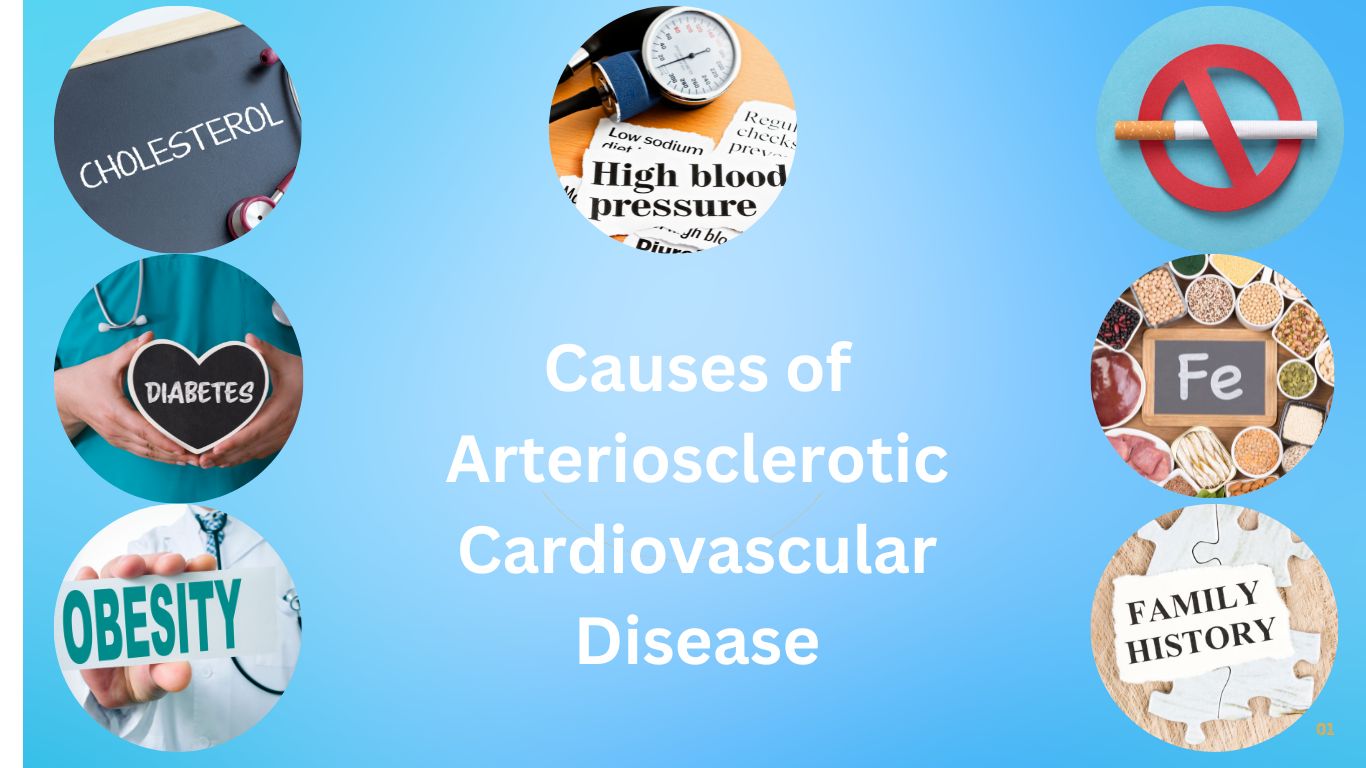Recently updated on May 30th, 2024 at 11:54 am
Arteriosclerotic Cardiovascular Disease (ASCVD) is a prevalent medical condition in the cardiovascular diseases list, affecting millions worldwide. It is a type of cardiovascular disease that primarily involves plaque buildup in the arteries, leading to narrowing and hardening of the blood vessels.

Causes of Arteriosclerotic Cardiovascular Disease:

High Cholesterol Levels:
Elevated levels of low-density lipoprotein (LDL) cholesterol, often called “bad cholesterol,” can lead to plaque formation in the arteries. LDL cholesterol can deposit on the arterial walls and trigger an inflammatory response, leading to the hardening of the arteries.
High Blood Pressure:
Hypertension, or high blood pressure, puts additional stress on the artery walls. Over time, this constant strain can damage the lining of the arteries, making them more susceptible to plaque buildup.
Smoking:
Tobacco smoke contains harmful chemicals that can damage the blood vessel’s inner lining, promoting plaque accumulation. It is one of the widely known cardiovascular disease facts.
Diabetes:
People with diabetes often have elevated blood sugar levels, which can contribute to the development of ASCVD. High blood sugar can damage the blood vessels and facilitate plaque formation.
Obesity and Sedentary Lifestyle:
Being overweight or obese and leading a sedentary lifestyle can increase the risk of developing arteriosclerotic cardiovascular disease. Lack of physical activity and poor dietary habits can lead to high cholesterol levels and hypertension.
Family History:
A family history of heart disease or stroke can increase an individual’s susceptibility to developing ASCVD.
Age and Gender:
As individuals age, the risk of developing cardiovascular disease increases. Men are generally at higher risk compared to pre-menopausal women, though the risk in women rises after menopause.
Other Risk Factors:
Other factors that may contribute to ASCVD include stress, excessive alcohol consumption, and certain medical conditions like chronic kidney disease and autoimmune disorders.
Care Tips for Arteriosclerotic Cardiovascular Disease:
Managing arteriosclerotic cardiovascular disease requires a comprehensive approach that addresses both the underlying causes and associated risk factors. Here are some essential care tips:
Healthy Diet:

Equally important is limiting the consumption of saturated and trans fats found in high-fat dairy products and processed foods and reducing the intake of sugary foods. Making these dietary adjustments helps to lower LDL cholesterol levels, maintain healthy blood pressure, and support overall heart function, reducing the risk of complications associated with ASCVD.
Regular Exercise:

Exercise strengthens the heart muscle, improves blood flow, and helps maintain healthy blood pressure levels. Additionally, it aids in weight management, reduces stress, and enhances overall well-being. Consistent physical activity can lower the risk of heart-related complications, making it a crucial component of ASCVD management and promoting a healthier, more active lifestyle.
Quit Smoking:

Seeking professional help or joining support groups can provide crucial guidance and emotional support throughout the cessation journey. These resources offer personalized strategies, coping mechanisms, and encouragement, making quitting more achievable and fostering a healthier, smoke-free lifestyle for individuals managing ASCVD.
Manage Stress:

These practices help activate the body’s relaxation response, lowering stress hormones and promoting a sense of calm and well-being. Regular practice of these techniques can aid in managing stress levels, reducing the impact of stress on the cardiovascular system, and contributing to better overall heart health in individuals with ASCVD and cardiovascular disease ICD 10.
Monitor Blood Pressure and Cholesterol:

By following the healthcare provider’s recommendations and making necessary lifestyle adjustments or taking prescribed medications, individuals can proactively manage their blood pressure and cholesterol levels, reducing the risk of complications associated with ASCVD and ensuring better cardiovascular health.
Diabetes Management:

Collaborating closely with healthcare professionals ensures a tailored approach that combines a diabetes-friendly diet, prescribed medications, and lifestyle changes. This comprehensive strategy minimizes cardiovascular risks, promotes stable blood sugar, and enhances overall health.
Medication Adherence:

Consistent adherence ensures the body receives the intended benefits, such as maintaining healthy blood pressure and cholesterol levels. Deviating from the prescribed regimen can undermine treatment efficacy, potentially leading to disease progression and complications.
Open communication with healthcare providers about any concerns or side effects is essential, as they can adjust medications if needed, ensuring optimal ASCVD management and safeguarding long-term heart health.
Weight Management:

Adopting a balanced, nutrient-rich diet while controlling portion sizes contributes to weight loss. Concurrently, engaging in physical activities like aerobic exercises and strength training not only aids in shedding pounds but also enhances heart function and circulation.
Weight reduction alleviates strain on the cardiovascular system, diminishing the risk of complications.
Regular Medical Check-ups:

Through comprehensive assessments, your healthcare team can evaluate the effectiveness of your treatment plan, including medications, lifestyle modifications, and risk factor management. Adjustments can be made promptly based on your evolving health status, ensuring optimal ASCVD control.
During these visits, open dialogue with your provider facilitates informed decision-making and fosters a collaborative approach to safeguarding your heart health and overall well-being.
FAQs
Conclusion:
Arteriosclerotic cardiovascular disease is a severe medical condition that requires practical management to reduce the risk of complications. By understanding the causes and implementing the care tips mentioned in this guide, individuals can take control of their heart health and lead a fulfilling life while minimizing the impact of ASCVD.
Always remember to work closely with healthcare professionals for personalized guidance and support on your journey to better heart health.

